Africa
Despite leading South Africa’s election ANC set to lose majority
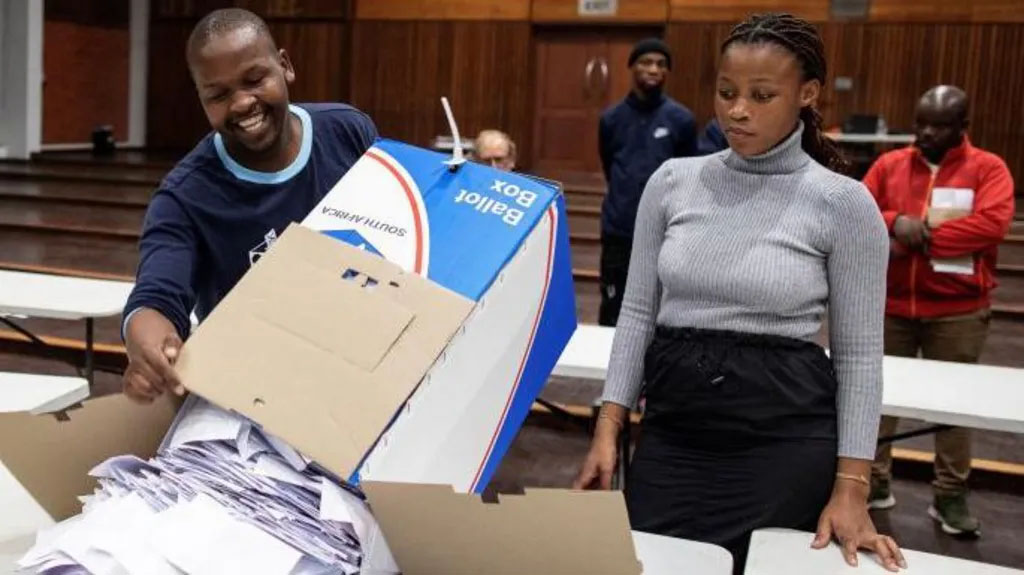
Despite leading South Africa’s election ANC set to lose majority
South Africa’s ruling party, the African National Congress (ANC), is on course to lose its majority in parliament for the first time since it came to power 30 years ago, partial results from Thursday’s parliamentary election suggest.
With results from more than 50% of voting districts counted so far, the ANC is leading with 42%, followed by the Democratic Alliance (DA) with 23%.
The the uMkhonto weSizwe Party (MK Party) of former President Jacob Zuma has received nearly 11% of the vote and the Economic Freedom Fighters party, nearly 10%.
Final results are expected over the weekend.
Many voters blame the ANC for the high levels of corruption, crime and unemployment in the country.
The respected Council for Scientific and Industrial Research (CSIR) and the News24 website have projected that the party’s final vote will be around 42%, a big drop from the 57% it obtained in the 2019 election.
This would force it go into a coalition with one or more of the other parties in order to form a majority in parliament.
The DA has liberal economic policies, while both the EFF and MK favour more state intervention and nationalisation, so the choice of partner would make a huge difference to South Africa’s future direction.
It is unclear whether President Cyril Ramaphosa will remain in power, as he could come under pressure from the ANC to resign if the party gets less than 45% of the final vote, said Prof William Gumede, chairman of the non-profit Democracy Works Foundation.
READ ALSO:
- Biden allows Ukraine to hit some targets in Russia with US weapons
- BREAKING: Many feared dead in another two-storey building collapse in Lagos
- Calm in Kano as District Heads pledge loyalty to Sanusi amidst legal tussle
“The ANC could turn him into a scapegoat, and a faction within the party could push for him to be replaced by his deputy, Paul Mashatile. The EFF and MK are also likely to demand his resignation before agreeing to any coalition with the ANC,” Prof Gumede told the BBC.
South Africans do not directly vote for a president. Instead they vote for members of parliament who will then go on to elect the president.
The initial results show that the ANC is suffering heavy losses to MK, especially in KwaZulu-Natal, where Mr Zuma’s party has been leading with 43% of the vote to the ANC’s 21%.
Mr Zuma caused a major shock when he announced in December that he was ditching the ANC to campaign for MK.
KwaZulu-Natal is the home region of Mr Zuma, and the province with the second-highest number of votes, making it crucial in determining whether the ANC retains its parliamentary majority.
Although Mr Zuma has been barred from running for parliament because of a conviction for contempt of court, his name still appeared on the ballot paper as MK leader.
If MK wins KwaZulu-Natal, it would be a “major upset” and herald the “potential decimation” of the ANC in the province, Prof Gumede said.
The ANC also risks losing its majority in the economic heartland of Gauteng, where the party currently has 36% to the DA’s 29%.
Wednesday’s election saw long lines of voters outside polling stations late into the night across the country.
According to the electoral commission, the last polling station closed at 0300 on Thursday morning local time.
READ ALSO:
- State varsities’ students to benefit from FG’s loan scheme
- Algeria circulates U.N. Security Council resolution demanding cease-fire in Gaza
- BREAKING: Gunmen kill four soldiers in Aba [VIDEO]
One electoral official in Johannesburg told the BBC the queues were reminiscent of the historic 1994 election, when black people could vote for the first time.
Sifiso Buthelezi, who voted in Johannesburg’s Joubert Park – the biggest polling station in South Africa – told the BBC: “Freedom is great but we need to tackle corruption.”
Change has been a recurring sentiment, especially among young voters.
“The turnout amongst them was high, and they voted against the ANC,” Prof Gumede said.
Ayanda Hlekwane, one of South Africa’s “born-free” generation, meaning he was born after 1994, said despite having three degrees he still did not have a job.
“I’m working on my PhD proposal so that I go back to study in case I don’t get a job,” he tells the BBC in Durban.
But Mr Hlekwane said he was optimistic that things would change.
Support for the ANC is expected to be higher among the older generation.
One 89-year-old woman, Elayne Dykman, told the BBC she hoped that young people in South Africa did not take their vote for granted.
A record 70 parties and 11 independents were running, with South Africans voting for a new parliament and nine provincial legislatures.
The DA has signed a pact with 10 of them, agreeing to form a coalition government if they get enough votes to dislodge the ANC from power.
But this is highly unlikely, with the ANC expected to remain the biggest party, putting it in pole position to lead a coalition.
Despite leading South Africa’s election ANC set to lose majority
Africa
Ghanaian ‘Noah’ Explains Why Christmas Flood Prophecy Failed to Happen

Ghanaian ‘Noah’ Explains Why Christmas Flood Prophecy Failed to Happen
A Ghanaian man, Ebo Noah, who drew global attention after building a massive wooden ark and predicting a catastrophic flood from December 25, has explained why the foretold disaster did not occur.
Ebo, who went viral in August after unveiling the structure known as the Ebo Noah Ark, had claimed he received a divine revelation warning of three years of devastating rainfall that would begin on Christmas Day and wipe out the world. He urged the public to repent and prepare for the impending calamity.
The prophecy and videos showing the construction and expansion of the ark attracted widespread media coverage and visitors from across Ghana and beyond, drawing comparisons with the biblical Noah.
READ ALSO:
- FG Approved Joint Nigeria–US Airstrikes on ISIS Targets in North-West — DHQ
- Shehu Sani: US Can’t Fight Nigeria’s Battles Forever Despite ISIS Strikes in North-West
- Christmas Day Explosion Triggers Panic in Sokoto Village After US ISIS Airstrikes
However, in a video message released on Thursday, Ebo said he later received a fresh revelation following periods of prayer, fasting and consultations with other religious leaders.
According to him, the new vision revealed that the number of people expected to seek refuge in the ark from around the world was far greater than its capacity, prompting him to appeal for divine intervention.
Ebo said he was subsequently granted more time to build additional arks to accommodate everyone, explaining that this was why the prophesied Christmas flood did not occur.
He also cautioned members of the public against rushing to the ark’s location, stressing that he was not selling tickets or collecting money from anyone.
Urging calm during the festive season, Ebo encouraged people to remain at home, enjoy the holidays and continue to repent, insisting that his message remained valid.
“Stay home. Enjoy yourself. Have fun. Merry Christmas and a Happy New Year. The ark is still there. Repent,” he said.
Ghanaian ‘Noah’ Explains Why Christmas Flood Prophecy Failed to Happen
Africa
Five Dead as Helicopter Crashes During Medical Evacuation on Mount Kilimanjaro
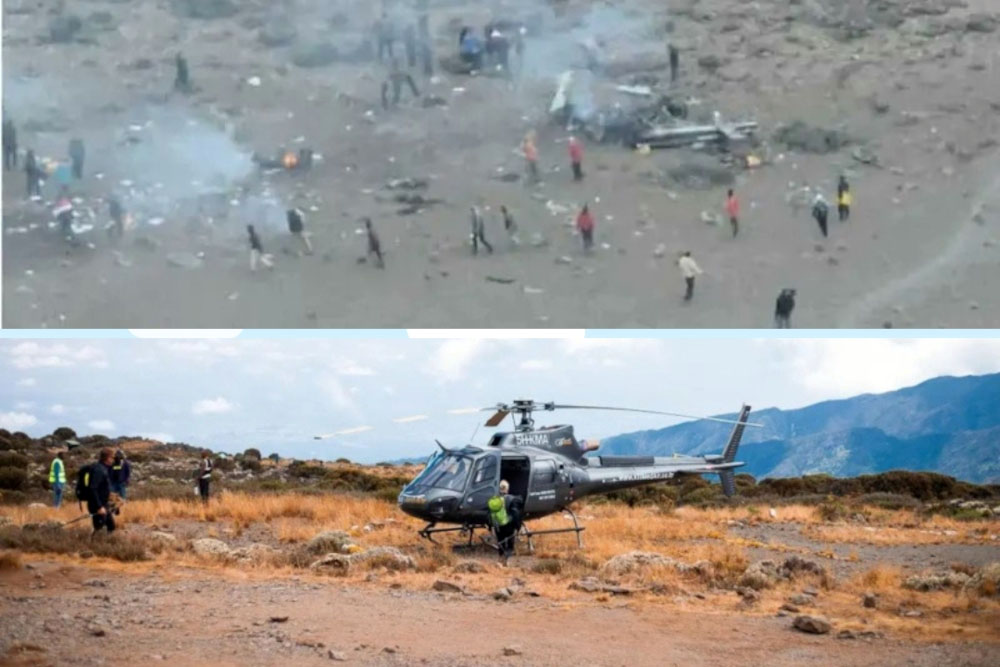
Five Dead as Helicopter Crashes During Medical Evacuation on Mount Kilimanjaro
At least five people have died after a helicopter crashed on Mount Kilimanjaro, Africa’s highest mountain, in northern Tanzania, authorities have confirmed.
The crash occurred on Wednesday evening along one of the mountain’s most popular climbing routes during what police described as a medical evacuation mission. The helicopter went down between Barafu Camp and Kibo Summit, at an altitude of more than 4,000 metres (13,100 feet).
According to the Kilimanjaro Regional Police Commander, Simon Maigwa, those killed include two foreign nationals who were being evacuated for medical reasons, as well as a local doctor, a tour guide, and the pilot.
READ ALSO:
- TikTok Influencer ‘Tea Tyme’ Arrested After Fatal Livestream Driving Crash
- Diddy Appeals Prostitution Conviction, Seeks Release as Lawyers Call Sentence Unconstitutional
- Uche Maduagwu Apologises to Davido, Admits Receiving ₦2.5m to Attack Singer Online
Police said the aircraft was operated by Kilimanjaro Aviation, a company that provides medical evacuation and aviation services in the region. The company had not issued a statement at the time of filing this report.
The Tanzania Civil Aviation Authority (TCAA) confirmed on Thursday that it has launched a full investigation into the incident, in line with international aviation safety standards, to determine the circumstances and probable cause of the crash.
Authorities noted that aircraft accidents on Mount Kilimanjaro are rare, with the last recorded helicopter crash occurring in November 2008, when four people were killed.
Police said more information would be released as investigations continue.
Five Dead as Helicopter Crashes During Medical Evacuation on Mount Kilimanjaro
skynews
Africa
Libyan Army Chief of Staff, Senior Officers Killed in Plane Crash in Turkey
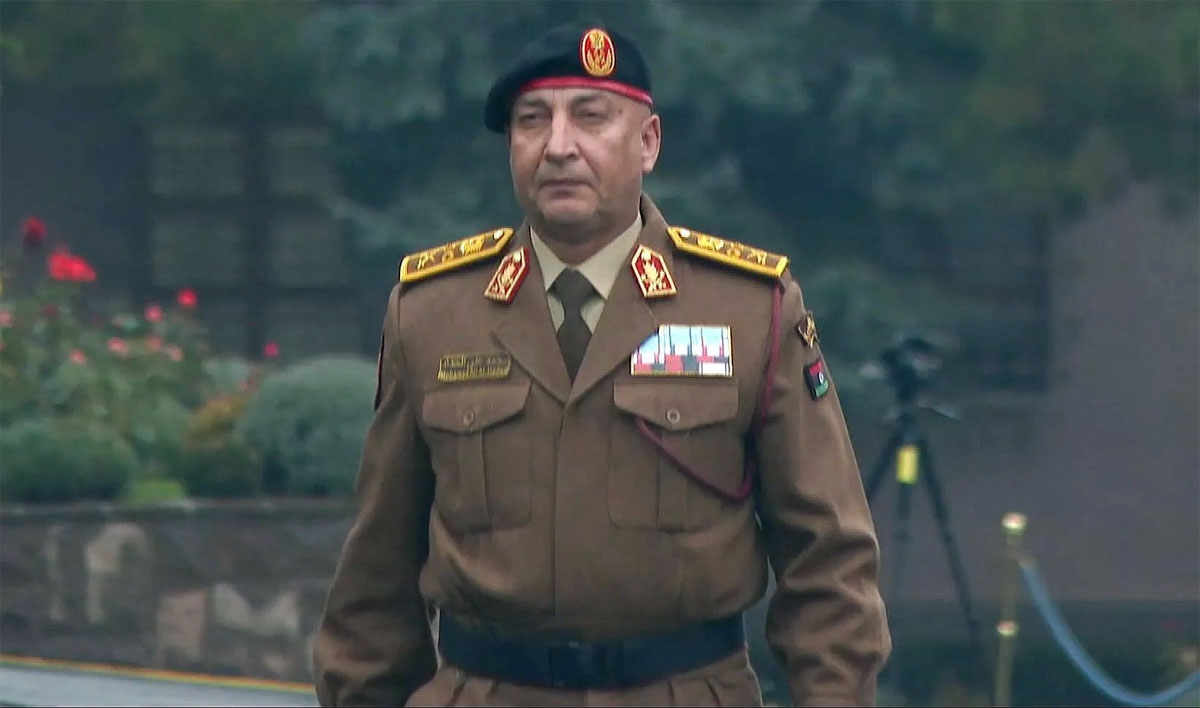
Libyan Army Chief of Staff, Senior Officers Killed in Plane Crash in Turkey
Libya’s Prime Minister, Abdulhamid Dbeibah, has confirmed the death of the Chief of General Staff of the Libyan Army, Mohammed al-Haddad, and several senior military officials in a plane crash in Turkey on Tuesday.
In a statement posted on his Facebook page, Dbeibah expressed deep grief over the incident, describing the deaths as a tragic national loss. “It is with deep sadness and great sorrow that we learnt of the death of the Libyan army’s chief of general staff,” the prime minister said.
READ ALSO:
- US Judge Upholds Trump’s $100,000 H-1B Visa Fee Despite Business, University Concerns
- EFCC Arraigns Ex-AGF Malami Over ₦9bn Money Laundering, 30 Choice Properties
- Outrage as Corps Member Is Killed in Adamawa, Police Launch Manhunt
According to Turkey’s Interior Minister, Ali Yerlikaya, the wreckage of the aircraft was discovered by the Turkish gendarmerie after it crashed shortly after taking off from Ankara, following an official visit by the Libyan delegation.
Dbeibah disclosed that the aircraft was carrying other high-ranking military officers as well as a photographer, all of whom were killed in the crash.
Haddad, who had served as Libya’s army chief of general staff since August 2020, was appointed during the tenure of former Prime Minister Fayez al-Sarraj. He was widely regarded as a key figure in Libya’s fragile security architecture.
Describing the victims as patriots, Dbeibah said Libya had lost men who served with “loyalty and dedication”, adding that they exemplified discipline, responsibility and national commitment.
Authorities in both Libya and Turkey are expected to release further details as investigations into the airplane accident continue.
Libyan Army Chief of Staff, Senior Officers Killed in Plane Crash in Turkey
-
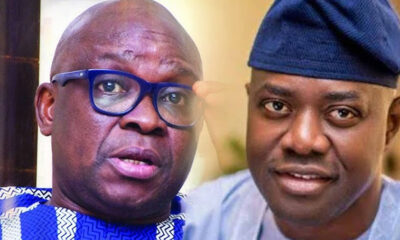
 metro3 days ago
metro3 days agoIbadan Explosion: Fayose Releases Documents, Claims Makinde Got ₦50bn from FG
-
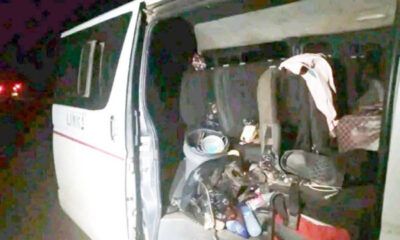
 metro3 days ago
metro3 days agoPlateau Kidnappers Demand ₦1.5m Each as 28 Muslim Travellers Remain in Captivity
-

 metro2 days ago
metro2 days agoNiger Delta Crackdown: Army Seizes ₦150m Stolen Oil, Arrests 19 Suspects
-

 Sports2 days ago
Sports2 days agoAnthony Joshua injured as two die in fatal Lagos-Ibadan Expressway crash (plus photos)
-

 Sports2 days ago
Sports2 days agoCristiano Ronaldo Wins Best Middle East Player at 2025 Globe Soccer Awards in Dubai
-

 metro1 day ago
metro1 day agoOgun Man Arrested After ₦4,000 Debt Dispute Claims Stepbrother’s Life
-
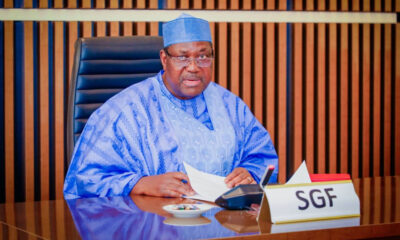
 metro22 hours ago
metro22 hours agoMrs. Regina Akume Urges SGF George Akume to Return to Christianity Amid New Marriage
-

 metro3 days ago
metro3 days agoBello Turji Not Killed in US Airstrikes, Security Expert Debunks Reports















